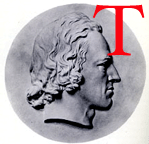 ennyson's "The Lotos-Eaters" contains a seductive defense of inaction. In the poem, exhausted sailors arrive at an island paradise of rivers and "cool mosses," where time seems to slow down and even flowers "han[g] in sleep." Tennyson devotes most of the three first stanzas to a sensuous word painting that provides a tour of the island's topography. Interestingly, when the poet describes the dynamic image of a flowing river, he uses the word "slumberous." Mountains are "silent pinnacles." In this way, every aspect of the scene is imbued with a feeling of repose. Fittingly, the "lotos" plant of the poem's title has the sedative effects of an opiate. This tempting flower dulls the senses and ambitions of any man that eats it.
ennyson's "The Lotos-Eaters" contains a seductive defense of inaction. In the poem, exhausted sailors arrive at an island paradise of rivers and "cool mosses," where time seems to slow down and even flowers "han[g] in sleep." Tennyson devotes most of the three first stanzas to a sensuous word painting that provides a tour of the island's topography. Interestingly, when the poet describes the dynamic image of a flowing river, he uses the word "slumberous." Mountains are "silent pinnacles." In this way, every aspect of the scene is imbued with a feeling of repose. Fittingly, the "lotos" plant of the poem's title has the sedative effects of an opiate. This tempting flower dulls the senses and ambitions of any man that eats it.
The second portion of "The Lotus Eaters" is devoted to a "Choric Song" in which the weary sailors present their defense of torpor. They argue that "There is no joy but calm" (68) and that "surely, slumber is more sweet than toil" (171). In the following passage, the sailors present a more complicated idea; they compare the behavior of an idle lotos-eater to that of a god who ignores the trials of man.
Let us swear an oath, and keep it with an equal mind,
In the hollow Lotos-land to live and lie reclined
On the hills like Gods together, careless of mankind. 155
For they lie beside their nectar, and the bolts are hurl'd
Far below them in the valleys, and the clouds are lightly curl'd
Round their golden houses, girdled with the gleaming world;
Where they smile in secret, looking over wasted lands,
Blight and famine, plague and earthquake, roaring deeps and fiery sands, 160
Clanging fights, and flaming towns, and sinking ships, and praying hands.
But they smile, they find a music centered in a doleful song
Steaming up, a lamentation and an ancient tale of wrong,
Like a tale of little meaning tho' the words are strong;
Chanted from an ill-used race of men that cleave the soil, 165
Sow the seed, and reap the harvest with enduring toil,
Storing yearly little dues of wheat, and wine and oil;
Till they perish and they suffer-some, 'tis whisper'd-down in hell
Suffer endless anguish, others in Elysian valleys dwell,
Resting weary limbs at last on beds of asphodel. [ll.153-70]
Questions
1. In the passage above, the sailors describe gods who are "careless of mankind," (155) though they observe the trials of humans. What judgment does the poet want his reader to make of the men who would lie "like Gods" (155)? Is idleness an acceptable quality for a divine being?
2. A similar theme appears in Tennyson's "the Palace of Art" (text). In this earlier work, an isolated and aloof figure says, "I care not what sects may brawl. I sit as God holding no form of creed, but contemplating all" (210-212). How do the passages from each poem compare?
3. There is a marked contrast between lines 156-159 and lines 160-162. What stylistic techniques does Tennyson use, if any, to highlight this difference?
4. The image of "praying hands" (161) is grouped with seemingly hopeless phrases such as "flaming towns" and "sinking ships" (161). There is no indication until the last line of the poem that the gods recognize such virtuous sights any more than the negative ones. Does this poem make an effective claim that toil is rewarded? Does it indicate the opposite?
Last modified 3 October 2006